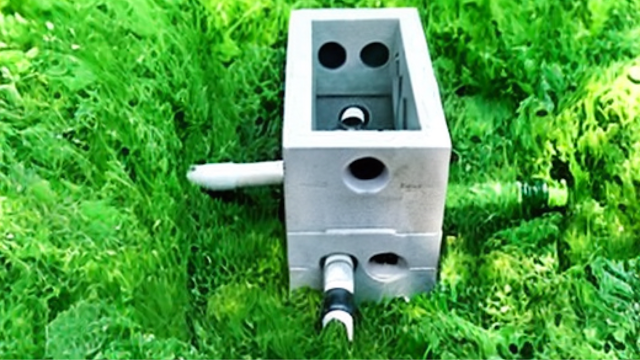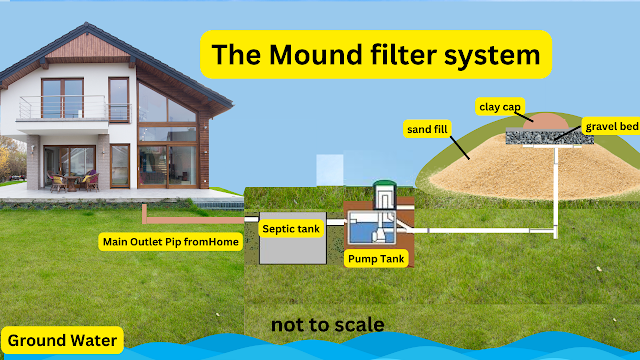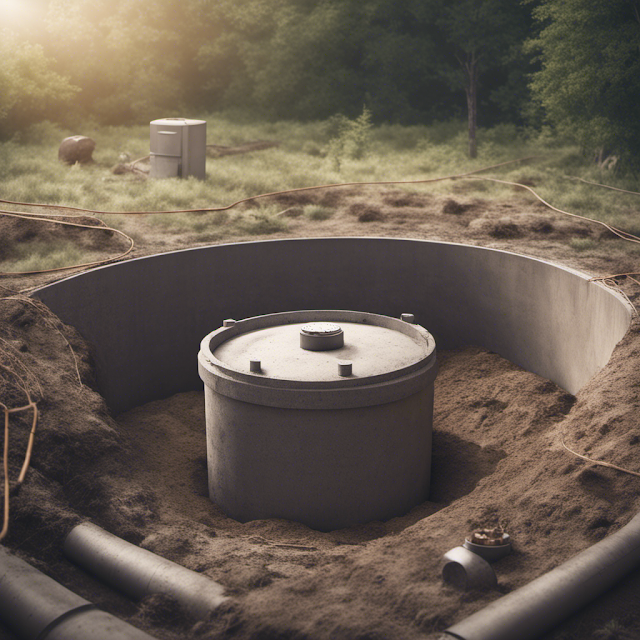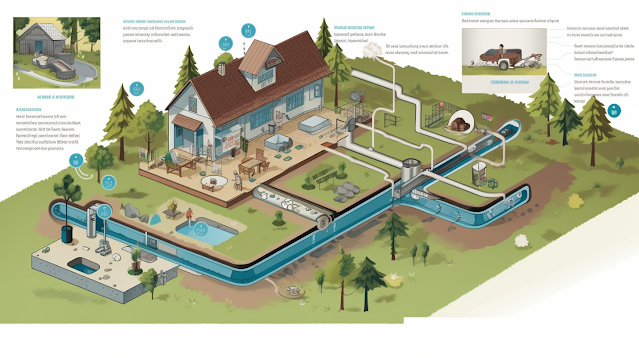Gravity Septic Systems: A Comprehensive Guide on Everything you need to know
.png) |
| diagram of a gravity septic system |
Introduction
Gravity septic systems are a vital yet often overlooked aspect of modern living. Their role in managing wastewater from households, particularly in rural areas, ensures a clean and safe environment for millions of people. Let's dive into the importance of these systems, and how they contribute to our daily lives.
If you want to skip to the FAQs these cover most points but in a condensed version
The Importance of Gravity Septic Systems
Gravity septic systems are the unsung heroes of wastewater management. They play a crucial role in:
Waste disposal: By breaking down and treating household wastewater, gravity septic systems prevent harmful substances from contaminating the environment. These systems utilize natural processes such as bacterial digestion and soil filtration to transform raw sewage into a safe effluent that can be discharged back into the environment. This not only protects the surrounding ecosystem but also helps maintain the overall health and well-being of local residents.
Water conservation: These systems recycle treated water, allowing it to be safely reintroduced into the environment, thus contributing to water conservation efforts. By returning treated wastewater to the water table, gravity septic systems help replenish groundwater resources, which are vital for agriculture, wildlife, and human consumption. In this way these systems play a critical role in preserving our planet's precious water resources.
Public health: Properly functioning septic systems reduce the risk of waterborne diseases by preventing contaminated water from entering water sources. When wastewater is inadequately treated or disposed of it can lead to the spread of harmful pathogens that cause diseases such as cholera dysentery and hepatitis. Gravity septic systems help protect public health by ensuring that wastewater is treated effectively before it re-enters the environment.
The Role of Septic Systems in Modern Living
In today's world, gravity septic systems are essential for homes located in rural areas or regions without access to centralized sewer systems. These systems provide an effective and eco-friendly solution for wastewater management. They also contribute to modern living by:
Supporting off-grid living: Gravity septic systems enable off-grid living by providing a reliable wastewater management solution for those looking to live self-sufficiently. As more people seek to reduce their reliance on public utilities and live more sustainably, gravity septic systems have become an indispensable component of off-grid lifestyles.
Promoting sustainable development: By reducing the need for extensive sewer infrastructure, these systems encourage sustainable development in rural areas and small communities. Gravity septic systems not only minimize the environmental impact of wastewater treatment but also promote responsible land use and resource management.
Enhancing property value: A well-functioning gravity septic system can increase the value of a property, as it ensures proper wastewater treatment and disposal. Prospective homebuyers are often willing to pay a premium for properties with efficient, low-maintenance septic systems, as they provide peace of mind and reduce long-term maintenance costs.
In conclusion, gravity septic systems play a vital role in modern living by offering a reliable, eco-friendly, and cost-effective solution for wastewater management. Their importance cannot be overstated, as they protect public health and the environment while supporting sustainable development and off-grid living. With their enduring appeal and numerous benefits, it's no wonder that these systems continue to be a popular choice for homeowners around the world. In the sections that follow, we'll explore the inner workings of gravity septic systems, as well as their advantages, troubleshooting tips, and maintenance guidelines. Stay tuned for an in-depth look at these marvelous mechanisms!
The Basics of
Gravity Septic Systems
Gravity septic systems are quite simple yet highly effective wastewater treatment solution. They work by harnessing the power of gravity (clue in the name)these systems are able to process and dispose of wastewater without the need for complex machinery or energy-intensive processes. In this section, we will look into the basic components of gravity septic systems and the installation process itself. Giving you a comprehensive understanding of how these systems actually work.
Components and How They Work Together
A typical gravity septic system consists of several key components that work in tandem together to treat and dispose of your wastewater:
Septic tank: The septic tank is a watertight underground container made of concrete fiberglass or plastic (have a look at the video on how a concrete one is made) bet you didn't realize. Its main function is to temporarily store all your wastewater, allowing solid waste to settle at the bottom (the poop mainly )as a sludge while lighter waste like oil and grease float to the top as scum. Bacteria within the tank break down the solid waste reducing its volume and transforming it into a more stable form. Bacteria is really important so dont go upsetting the balance.
Outlet filter: Positioned at the outlet pipe of the septic tank, this filter prevents larger solids from leaving the tank and entering the drain field, well you wouldn't want a field full of ! The filter plays a crucial role in protecting the drain field from clogging and prolonging its lifespan.
Distribution box: The distribution box is a small concrete or plastic structure that evenly distributes the partially treated wastewater from the septic tank into the drain field pipes. This ensures that the wastewater is spread evenly throughout the drain field optimizing the treatment and preventing overloading of specific areas in the field.
Drain field: Also known as a leach field or soil absorption system, mainly though we just call it the drain field keep it simple. The drainfield is a series of perforated pipes laid in gravel-filled trenches or beds. Wastewater from the distribution box flows into these pipes and then percolates through the surrounding gravel and soil. The soil acts as a natural filter, removing harmful bacteria, viruses, and nutrients before the treated water re-enters the groundwater system. IMPORTANT CHECK HERE if you have a drinking water well near your septic tank
These components are designed to work together seamlessly and they do its a great system. Utilizing natural processes to treat and dispose of wastewater effectively like this is one of our favored systems. The success of a gravity septic system relies on the proper functioning of each component and the careful balance of the biological chemical and physical processes that occur within the system so as we said don't go messing them up. We will cover how you mess them up later.
Installation Process and Requirements
The installation of a gravity septic system requires careful planning and adherence to local regulations to ensure optimal performance and environmental safety. The process typically involves the following steps:
Site evaluation: A professional septic system designer or engineer will evaluate the property to determine its suitability for a gravity septic system. This assessment includes conducting soil tests analyzing topography ( look it up or follow the link on topography) and evaluating the depth of the water table. The results of the evaluation will determine the size and design of the septic system.
Design and permitting: Once the site is deemed suitable the designer will develop a detailed plan for the septic system, including the layout of the tank, distribution box, and drain field. The plan must comply with local regulations and guidelines and a permit must be obtained from the relevant authorities before installation can commence.
Excavation and installation: A licensed septic system installer will excavate the site according to the approved plan and install the septic tank, distribution box, and drain field components. Careful attention must be paid to ensure that the system is installed at the correct depth, and that the pipes are laid with the proper slope to facilitate gravity-driven wastewater flow.
Inspection and backfill: Once the system is installed, it must be inspected by a qualified professional to ensure that it meets all regulatory requirements and is functioning correctly. After a successful inspection the excavated areas will be backfilled with soil and the system can be connected to the household plumbing.
So to conclude on the basics of gravity septic systems involve a combination of carefully designed components and natural processes that work together to effectively treat and dispose of the wastewater. Understanding the key components and all their functions as well as the installation process and requirements, is essential for homeowners.
When you are considering a gravity septic system for your home. Arm yourself with the knowledge and then speak with professionals it will give you some info to know if they are talking well s**t. In all seriousness though you do need to watch out for some of the unscrupulous septic tank installers who if they think you know nothing will rip you off.
Also on installation, you can ensure that each component is properly installed so you can enjoy the benefits of a reliable, eco-friendly, and really cost-effective wastewater management solution for your home. In the following sections, we'll explore the advantages of gravity septic systems troubleshooting tips, and maintenance guidelines to help you get the most out of your system.
 |
| Gravity Septic Systems Dig out |
Advantages of Gravity Septic Systems
Gravity septic systems have long been a popular choice for homeowners due to their numerous advantages. These systems offer an effective, low-maintenance, and eco-friendly solution for wastewater management, particularly in rural areas or regions without access to centralized sewer systems. In this section, we'll explore the key advantages of gravity septic systems, providing a comprehensive understanding of why they continue to be a preferred option for many property owners.
Cost-Effectiveness
One of the primary benefits of gravity septic systems is their cost-effectiveness. These systems typically have lower installation, operation, and maintenance costs compared to alternative wastewater treatment options, such as aerobic treatment units or pressure distribution systems. Key factors contributing to the cost-effectiveness of gravity septic systems include:
Simplicity: Gravity septic systems rely on the natural force of gravity to move wastewater from the septic tank to the drain field, eliminating the need for mechanical pumps, electrical components, or complex control systems. This simplicity not only reduces installation costs but also minimizes the potential for equipment breakdowns and the associated repair expenses.
Energy efficiency: As gravity septic systems do not require pumps or other energy-consuming components, they are more energy-efficient than other types of septic systems. This results in lower energy costs for homeowners and a smaller environmental footprint.
Lower maintenance costs: The simplicity of gravity septic systems also translates to lower maintenance costs. While regular inspections and pumping are still necessary, these systems generally require less frequent and less costly maintenance compared to other wastewater treatment options. In addition, the absence of mechanical components reduces the likelihood of costly repairs and prolongs the system's overall lifespan.
Low Maintenance
Gravity septic systems are known for their low-maintenance nature, which is a significant advantage for homeowners who want a reliable wastewater management solution with minimal upkeep requirements. Some of the factors that contribute to the low-maintenance nature of these systems include:
Minimal mechanical components: As mentioned earlier, gravity septic systems do not rely on mechanical pumps or other moving parts that can break down or require regular maintenance. This reduces the need for ongoing repairs and maintenance, making these systems more convenient for homeowners.
Biological processes: Gravity septic systems harness the power of natural biological processes to break down and treat wastewater. Bacteria within the septic tank digest solid waste, while the soil in the drain field filters and treats the wastewater before it re-enters the groundwater system. These natural processes require minimal intervention, further contributing to the low-maintenance nature of these systems.
Long service life: When properly installed and maintained, gravity septic systems can have a service life of up to 30 years or more. This long lifespan reduces the need for costly replacements and ensures a reliable wastewater management solution for many years.
Reliability and Longevity
Gravity septic systems are highly regarded for their reliability and longevity, making them an appealing option for homeowners seeking a long-lasting and dependable wastewater treatment solution. Key factors contributing to the reliability and longevity of these systems include:
Proven track record: Gravity septic systems have been in use for decades and have a proven track record of effectively treating and disposing of wastewater. Their long history of success attests to their reliability and effectiveness as a wastewater management solution.
Natural processes: As previously mentioned, gravity septic systems rely on natural processes to treat and dispose of wastewater. These processes are inherently stable and less prone to failures or disruptions compared to mechanical or energy-dependent systems.
Durable materials: The materials used in the construction of gravity septic systems, such as concrete, fiberglass, or plastic, are highly durable and resistant to corrosion or other forms of degradation. This ensures that the system remains functional and intact over an extended period of time, providing homeowners with a long-lasting wastewater management solution.
Environmental Friendliness
Gravity septic systems are known for their eco-friendly nature, which is an important consideration for homeowners who prioritize environmental sustainability. These systems effectively treat wastewater while minimizing the environmental impact through the following factors:
Natural treatment processes: By utilizing bacterial digestion and soil filtration, gravity septic systems treat wastewater using natural processes that are inherently eco-friendly. These processes remove harmful bacteria, viruses, and nutrients from the wastewater, ensuring that it is safe to re-enter the environment.
Energy efficiency: As mentioned earlier, gravity septic systems do not require energy-consuming pumps or other mechanical components. This energy efficiency not only reduces operating costs for homeowners but also reduces the system's overall environmental footprint.
Water conservation: By returning treated wastewater to the water table, gravity septic systems help replenish groundwater resources, which are essential for agriculture, wildlife, and human consumption. This contributes to water conservation efforts and supports the overall health of the surrounding ecosystem.
 |
| Gravity septic system leach field |
In conclusion, the advantages of gravity septic systems make them an ideal choice for many homeowners seeking a cost-effective, low-maintenance, reliable, and eco-friendly wastewater management solution. By understanding the key benefits of these systems, property owners can make informed decisions about the most suitable wastewater treatment option for their needs. In the upcoming sections, we will discuss troubleshooting tips and maintenance guidelines to help homeowners get the most out of their gravity septic systems, ensuring optimal performance and longevity.
Troubleshooting Common Issues
While gravity septic systems are known for their reliability, issues can still arise from time to time. Properly diagnosing and addressing these issues is essential to maintaining the performance and longevity of your septic system. In this section, we'll explore common problems that homeowners may encounter with their gravity septic systems and provide guidance on how to troubleshoot and resolve these issues.
Slow Draining or Gurgling Fixtures
One of the first signs of a problem with your gravity septic system may be slow-draining sinks, toilets, and other fixtures, or gurgling noises coming from the pipes. These issues can be caused by several factors, including:
Clogged pipes: Blockages in your home's plumbing system or the septic system's pipes can restrict the flow of wastewater, leading to slow draining or gurgling fixtures. In some cases, you may be able to clear the blockage using a plunger or drain snake. If the problem persists or worsens, it's best to consult a professional plumber or septic system specialist.
Full septic tank: If your septic tank is full or nearing capacity, it may struggle to handle the incoming wastewater, resulting in slow-draining fixtures. Regular pumping and inspection of your septic tank are essential to prevent overloading and maintain optimal system performance.
Compacted drain field: Over time, the soil in your drain field can become compacted, reducing its ability to effectively filter and absorb wastewater. This can lead to slow-draining fixtures and even wastewater surfacing in your yard. In these cases, it's crucial to consult a septic system professional to assess the issue and recommend a course of action.
Foul Odors
Unpleasant odors coming from your septic system can be a sign of a real problem that requires attention. Its more than juts unpleasant it can have dangers here are some common causes of foul odors include:
Blocked vent pipe: Your septic system relies on vent pipes to release sewer gases safely away from your home. If the vent pipe becomes blocked, these gases can become trapped, causing foul odors around your property. Clearing the blockage, either by yourself or with the help of a professional, can help to resolve this issue.
Full septic tank: As previously mentioned a full septic tank can lead to slow-draining fixtures and foul odors. Regular pumping and inspection can help to prevent these issues and maintain the overall health of your septic system.
Drain field issues: If your drain field is not functioning properly, it can result in foul odors, as the wastewater is not being effectively treated and absorbed. In such cases, it's essential to consult a septic system professional to diagnose and address the problem. There can be real dangers with septic tank gases.
Wastewater Surfacing in the Yard
If you notice wastewater pooling or surfacing in your yard, it's a clear indication that something is amiss with your septic system. Potential causes of this issue include:
Full septic tank: As discussed earlier, a full septic tank can lead to a range of problems, including wastewater surfacing in your yard. Regular pumping and inspection are crucial for preventing this issue.
Drain field failure: A failing drain field can result in wastewater surfacing on your property, as the system is no longer able to effectively filter and absorb the wastewater. In such cases, you may need to repair or replace the drain field, which should be done by a septic system professional.
Broken pipes: Damaged or broken pipes in your septic system can cause wastewater to leak and surface in your yard. If you suspect this may be the issue, it's essential to consult a professional to locate and repair the damaged pipes.
In conclusion, troubleshooting common issues with your gravity septic system is an essential part of maintaining its performance and longevity. By regularly monitoring your system and addressing any problems that arise, you can ensure that your septic system remains an effective and reliable wastewater management solution for your property. In the following section, we'll discuss maintenance guidelines to help you get the most out of your gravity septic system and prevent potential issues from developing.
Routine Maintenance and Care
Establishing a routine maintenance and care plan for your gravity septic system is a good habit to get into. This will ensure its optimal performance reliability and longevity. Also, regular maintenance can help prevent costly repairs and system failures and protect the environment as well as safeguard the health and safety of your family. In this section, we'll explore the various aspects of routine maintenance and care for gravity septic systems and provide guidelines for implementing an effective maintenance plan.
 |
| Gravity septic system regular maintenance inspection |
Inspection and Monitoring
A key aspect of routine maintenance and care is regularly inspecting and monitoring your gravity septic system. This involves:
Scheduling professional inspections: As previously mentioned, it's recommended that homeowners schedule professional septic system inspections every 3 to 5 years. These inspections can help identify potential issues early on, allowing you to address them before they escalate.
Conducting visual inspections: In addition to professional inspections, it's a good idea for homeowners to perform visual inspections of their septic system components, such as the septic tank access lid, vent pipes, and drain field area. Look for signs of damage, blockages, or other issues that may require attention.
Monitoring water usage: Being mindful of your household's water usage can help prevent overloading your septic system. Consider implementing water-saving practices, such as fixing leaks, installing low-flow fixtures, and using water-efficient appliances.
Septic Tank Pumping and Cleaning
Regular septic tank pumping and cleaning are crucial components of routine maintenance and care for gravity septic systems. This involves:
Scheduling regular septic tank pumping: As previously discussed, it's generally recommended that homeowners pump their septic tanks every 3 to 5 years. However, the specific frequency may vary depending on factors such as tank size, household size, and water usage habits. Consult a septic system professional to determine the most appropriate pumping schedule for your system.
Cleaning the tank: During the pumping process, it's essential to have the septic tank cleaned to remove any remaining sludge or debris. This helps maintain the overall health and efficiency of your septic system.
Drain Field Maintenance
Proper drain field maintenance is another critical aspect of routine maintenance and care for gravity septic systems. As discussed earlier, drain field maintenance involves:
Protecting the drain field from compaction: Avoid driving or parking vehicles on the drain field area to prevent soil compaction and potential damage to underground pipes.
Selecting appropriate vegetation: Plant only grass or shallow-rooted plants over the drain field to minimize the risk of damage to underground pipes.
Managing water runoff: Ensure that gutters, downspouts, and other sources of water runoff are directed away from the drain field to prevent saturation and reduced absorption capacity.
Monitoring for signs of trouble: Keep an eye out for indicators of drain field issues, such as foul odors, wastewater surfacing, or unusually lush vegetation growth. If you notice any of these signs, consult a septic system professional to address the problem.
Educating Household Members
Educating your household members about the proper use and care of your gravity septic system is an essential aspect of routine maintenance. This includes:
Being mindful of what goes down the drain: Educate your family members about the importance of not disposing of inappropriate items or substances in sinks, toilets, or other drains, as this can lead to blockages, system damage, or reduced treatment efficiency.
Using septic-safe products: Encourage your household members to use septic-safe household products, such as biodegradable soaps and detergents, to prevent harm to the beneficial bacteria in your septic system.
Conserving water: Teach your family members about water-saving practices and the importance of conserving water to prevent overloading your septic system. This can include simple habits such as turning off the tap while brushing teeth, taking shorter showers, and only running the dishwasher and washing machine with full loads.
By implementing a routine maintenance and care plan for your gravity septic system, you can ensure its optimal performance, reliability, and longevity. Regular inspections, septic tank pumping and cleaning, drain field maintenance, and educating household members about proper septic system care are all crucial aspects of maintaining a healthy and efficient gravity septic system. With the right care and attention, your septic system can provide a reliable, low-maintenance, and environmentally friendly wastewater management solution for your property for many years to come.
FAQs
1.What is a gravity septic system?
A gravity septic system is a wastewater management solution commonly used in rural areas where there is no access to municipal sewer systems. It relies on gravity to transport wastewater from a home to a septic tank and then to a drain field, where it is naturally treated before re-entering the environment. Gravity septic systems consist of three main components: the septic tank, the drain field, and the connecting pipes.
How does a gravity septic system work?
A gravity septic system works by using gravity to move wastewater from a home through a series of pipes to a septic tank. The septic tank is an underground chamber where solids and liquids are separated. Solids settle at the bottom of the tank, forming a layer of sludge, while lighter materials such as grease and oils float to the top, creating a layer of scum. The liquid wastewater in the middle, called effluent, flows from the tank to the drain field. In the drain field, the effluent is filtered through layers of soil, which naturally remove harmful bacteria, viruses, and nutrients before the water re-enters the groundwater supply.
How do I know if I have a gravity septic system?
If you live in a rural area without access to a municipal sewer system, you likely have some type of septic system. To determine if you have a gravity septic system, you can look for a septic tank access lid and vent pipes in your yard. You can also check your property records or consult a septic system professional to inspect and identify your system.
How often should I have my gravity septic system inspected?
It's generally recommended that homeowners have their gravity septic systems inspected by a professional every 3 to 5 years. However, the specific frequency may vary depending on factors such as the size of your septic tank, the number of people living in your household, and your water usage habits.
How often should I pump my septic tank?
On average, it's recommended that homeowners pump their septic tanks every 3 to 5 years. However, this frequency may vary depending on factors such as the size of your tank, the number of people in your household, and your water usage habits. Consult a septic system professional to determine the most appropriate pumping schedule for your specific system.
What are the signs of a failing gravity septic system?
Signs of a failing gravity septic system can include foul odors, wastewater surfacing in your yard or near the drain field, slow-draining sinks and toilets, gurgling noises in your plumbing, or unusually lush vegetation growth in the drain field area. If you notice any of these indicators, consult a septic system professional to assess and address the problem.
What can I do to prolong the life of my gravity septic system?
To prolong the life of your gravity septic system, follow a routine maintenance and care plan that includes regular inspections, septic tank pumping and cleaning, drain field maintenance, and educating your household members about proper septic system care. Implement water-saving practices and be mindful of what goes down your drains to prevent overloading your system and causing damage.
Are gravity septic systems environmentally friendly?
Gravity septic systems can be environmentally friendly when properly designed, installed, and maintained. They treat wastewater naturally through biological processes in the septic tank and soil filtration in the drain field, removing harmful bacteria, viruses, and nutrients before the water re-enters the groundwater supply. However, failing or poorly maintained systems can contribute to water pollution and pose risks to public health and the environment.
Can I plant a garden over my drain field?
Planting a garden over your drain field is generally not recommended, as certain plants with deep root systems can damage the underground pipes. It's best to plant only grass or shallow-rooted plants over the drain field to minimize the risk of damage. Additionally, avoid placing heavy objects or driving vehicles on the drain field to prevent soil compaction and potential damage to the pipes.
What should I avoid flushing down my drains to protect my gravity septic system?
To protect your gravity septic system, avoid flushing items such as grease, oil, coffee grounds, food scraps, baby wipes, diapers, sanitary products, paper towels, cigarettes, and chemicals like paint, solvents, or pesticides down your drains. These items can cause blockages, system damage, or disrupt the natural treatment processes in your septic tank.
Do I need a permit to install or repair a gravity septic system?
In most jurisdictions, you will need a permit to install or repair a gravity septic system. Permit requirements and processes vary depending on your location, so it's essential to consult your local health department or permitting agency for specific information and guidance.
Can I install a gravity septic system on a sloped property?
A gravity septic system can be installed on a sloped property, as the system relies on gravity to transport wastewater. However, careful design and planning are necessary to ensure that the system functions properly and meets local regulations. Consult a septic system professional to assess your property and design an appropriate system.
How much does it cost to install a gravity septic system?
The cost to install a gravity septic system can vary depending on factors such as your location, property conditions, system size, and installation complexity. On average, the cost can range from $3,000 to $15,000 or more. It's essential to obtain multiple quotes from reputable septic system professionals to get an accurate estimate for your specific situation.
What are the alternatives to a gravity septic system?
Alternatives to gravity septic systems include pressure distribution systems, mound systems, sand filter systems, and aerobic treatment units (ATUs). These systems may be more suitable for properties with specific site conditions, such as high water tables, poor soil quality, or limited space. Consult a septic system professional to determine the most appropriate system for your property.
Do gravity septic systems require electricity?
Gravity septic systems do not typically require electricity, as they rely on gravity to transport wastewater from the home to the septic tank and drain field. However, some systems may include optional components, such as effluent filters or risers, that require electricity. Consult a septic system professional for information about your specific system.
Can I convert my gravity septic system to another type of system?
Converting a gravity septic system to another type of system may be possible, depending on your property conditions and local regulations. Consult a septic system professional to assess your property and determine whether a conversion is feasible and what type of system would be most appropriate.
How long does a gravity septic system last?
The lifespan of a gravity septic system can range from 20 to 40 years or more, depending on factors such as system design, installation quality, and maintenance practices. Regular inspections, septic tank pumping and cleaning, drain field maintenance, and proper use and care can help prolong the life of your septic system.
How can I find a reputable septic system professional in my area?
To find a reputable septic system professional in your area, consider asking for recommendations from friends, neighbors, or local contractors who have had septic work done. You can also search online for professionals near you and read reviews from previous customers. Check for credentials, such as licenses and certifications, and verify that the professional is insured. Additionally, obtain multiple quotes and ask for references to ensure you're choosing a reliable and experienced professional.
What are the warning signs that my septic tank is full?
Warning signs that your septic tank may be full include slow-draining sinks and toilets, gurgling noises in your plumbing, foul odors near the septic tank or drain field, wastewater surfacing in your yard or near the drain field, and unusually lush vegetation growth in the drain field area. If you notice any of these signs, consult a septic system professional to inspect your tank and determine whether it needs pumping.
How can I reduce water usage to minimize stress on my gravity septic system?
Reducing water usage can help minimize stress on your gravity septic system and prolong its life. Some water-saving strategies include fixing leaks promptly, installing water-efficient fixtures and appliances, using a broom instead of a hose to clean driveways and sidewalks, collecting rainwater for outdoor watering, and implementing water-wise landscaping practices. Encourage household members to adopt water-saving habits, such as turning off the tap while brushing teeth, taking shorter showers, and only running the dishwasher and washing machine with full loads.
By following these guidelines and maintaining a proactive approach to your gravity septic system's care and maintenance, you can enjoy a reliable and efficient wastewater management solution for your property for many years to come. Regular inspections, septic tank pumping, and drain field maintenance are crucial for ensuring the optimal performance and longevity of your system. Educate yourself and your household members about proper septic system care and adopt water-saving practices to minimize stress on your system and protect the environment.
Conclusion
In conclusion, gravity septic systems provide a vital wastewater management solution for many rural properties without access to municipal sewer systems. These systems rely on gravity to transport wastewater from the home to the septic tank and drain field, where natural biological processes and soil filtration treat the wastewater before it re-enters the groundwater supply. Properly designed, installed, and maintained gravity septic systems can offer a reliable, low-maintenance, and environmentally friendly alternative to traditional sewer systems.
Throughout this article, we have explored various aspects of gravity septic systems, including their basic components and functionality, advantages, troubleshooting common issues, routine maintenance and care, and frequently asked questions. It is essential to understand each of these areas to ensure the optimal performance and longevity of your gravity septic system.
One of the primary advantages of gravity septic systems is their relatively simple design, which relies on gravity rather than mechanical components to move wastewater. This simplicity can result in lower installation and maintenance costs compared to other types of septic systems. Additionally, when properly maintained, gravity septic systems can effectively treat wastewater and protect the environment by removing harmful bacteria, viruses, and nutrients.
However, like any wastewater management solution, gravity septic systems can experience issues and failures if not properly maintained. Regular inspections, septic tank pumping and cleaning, and drain field maintenance are crucial for preventing problems such as blockages, system overloading, and environmental contamination. Addressing issues promptly and consulting a septic system professional when necessary can help ensure the continued reliability and efficiency of your system.
Education plays a significant role in maintaining a healthy gravity septic system. Homeowners and household members should understand the importance of proper septic system care and the potential consequences of system failures. This includes being mindful of what goes down the drains, adopting water-saving practices, and scheduling routine inspections and maintenance.
In our comprehensive FAQs section, we addressed many common questions and concerns related to gravity septic systems, from identifying and maintaining your system to understanding costs and alternative options. Providing clear and accurate answers to these questions can help homeowners make informed decisions about their septic system needs and ensure the long-term success of their wastewater management solution.
Ultimately, the key to a successful gravity septic system is proactive care and maintenance. By following a regular maintenance schedule, addressing issues promptly, and adopting water-saving practices, homeowners can extend the life of their septic system and minimize the risk of costly repairs or environmental damage. It is essential to work with a reputable septic system professional to design, install, and maintain your gravity septic system to ensure its optimal performance and compliance with local regulations.
As we conclude our in-depth exploration of gravity septic systems, it's essential to recognize the critical role these systems play in managing wastewater for many rural properties. With proper care and maintenance, gravity septic systems can provide a reliable and environmentally responsible solution for wastewater management, protecting public health and the environment for generations to come.
.png)









Comments
Post a Comment